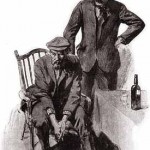“What’s this? What’s this?” said a voice, and there he was in the room. He had overheard my last words, and a glance at our faces had told him the rest. In an instant his chubby, cheery face set into an expression of absolute ferocity.
“Might I trouble you to walk outside, Marshall?” said he. (I may mention that my own name is Marshall King.)
He closed the door behind me, and then, for an instant, I heard him talking in a low voice of concentrated passion to his wife. This gross breach of hospitality had evidently hit upon his tenderest point. I am no eavesdropper, so I walked out on to the lawn. Presently I heard a hurried step behind me, and there was the lady, her face pale with excitement, and her eyes red with tears.
“My husband has asked me to apologize to you, Mr. Marshall King,” said she, standing with downcast eyes before me.
“Please do not say another word, Mrs. King.”
Her dark eyes suddenly blazed out at me.
“You fool!” she hissed, with frantic vehemence, and turning on her heel swept back to the house.
The insult was so outrageous, so insufferable, that I could only stand staring after her in bewilderment. I was still there when my host joined me. He was his cheery, chubby self once more.
“I hope that my wife has apologized for her foolish remarks,” said he.
“Oh, yes—yes, certainly!”
He put his hand through my arm and walked with me up and down the lawn.
“You must not take it seriously,” said he. “It would grieve me inexpressibly if you curtailed your visit by one hour. The fact is—there is no reason why there should be any concealment between relatives—that my poor dear wife is incredibly jealous. She hates that anyone—male or female—should for an instant come between us. Her ideal is a desert island and an eternal tete-a-tete. That gives you the clue to her actions, which are, I confess, upon this particular point, not very far removed from mania. Tell me that you will think no more of it.”
“No, no; certainly not.”
“Then light this cigar and come round with me and see my little menagerie.”
The whole afternoon was occupied by this inspection, which included all the birds, beasts, and even reptiles which he had imported. Some were free, some in cages, a few actually in the house. He spoke with enthusiasm of his successes and his failures, his births and his deaths, and he would cry out in his delight, like a schoolboy, when, as we walked, some gaudy bird would flutter up from the grass, or some curious beast slink into the cover. Finally he led me down a corridor which extended from one wing of the house. At the end of this there was a heavy door with a sliding shutter in it, and beside it there projected from the wall an iron handle attached to a wheel and a drum. A line of stout bars extended across the passage.
“I am about to show you the jewel of my collection,” said he. “There is only one other specimen in Europe, now that the Rotterdam cub is dead. It is a Brazilian cat.”
“But how does that differ from any other cat?”
“You will soon see that,” said he, laughing. “Will you kindly draw that shutter and look through?”
I did so, and found that I was gazing into a large, empty room, with stone flags, and small, barred windows upon the farther wall. In the centre of this room, lying in the middle of a golden patch of sunlight, there was stretched a huge creature, as large as a tiger, but as black and sleek as ebony. It was simply a very enormous and very well-kept black cat, and it cuddled up and basked in that yellow pool of light exactly as a cat would do. It was so graceful, so sinewy, and so gently and smoothly diabolical, that I could not take my eyes from the opening.
“Isn’t he splendid?” said my host, enthusiastically.
“Glorious! I never saw such a noble creature.”
“Some people call it a black puma, but really it is not a puma at all. That fellow is nearly eleven feet from tail to tip. Four years ago he was a little ball of black fluff, with two yellow eyes staring out of it. He was sold me as a new-born cub up in the wild country at the head-waters of the Rio Negro. They speared his mother to death after she had killed a dozen of them.”
“They are ferocious, then?”
“The most absolutely treacherous and bloodthirsty creatures upon earth. You talk about a Brazilian cat to an up-country Indian, and see him get the jumps. They prefer humans to game. This fellow has never tasted living blood yet, but when he does he will be a terror. At present he won’t stand anyone but me in his den. Even Baldwin, the groom, dare not go near him. As to me, I am his mother and father in one.”
As he spoke he suddenly, to my astonishment, opened the door and slipped in, closing it instantly behind him. At the sound of his voice the huge, lithe creature rose, yawned and rubbed its round, black head affectionately against his side, while he patted and fondled it.
“Now, Tommy, into your cage!” said he.
The monstrous cat walked over to one side of the room and coiled itself up under a grating. Everard King came out, and taking the iron handle which I have mentioned, he began to turn it. As he did so the line of bars in the corridor began to pass through a slot in the wall and closed up the front of this grating, so as to make an effective cage. When it was in position he opened the door once more and invited me into the room, which was heavy with the pungent, musty smell peculiar to the great carnivora.
“That’s how we work it,” said he. “We give him the run of the room for exercise, and then at night we put him in his cage. You can let him out by turning the handle from the passage, or you can, as you have seen, coop him up in the same way. No, no, you should not do that!”




